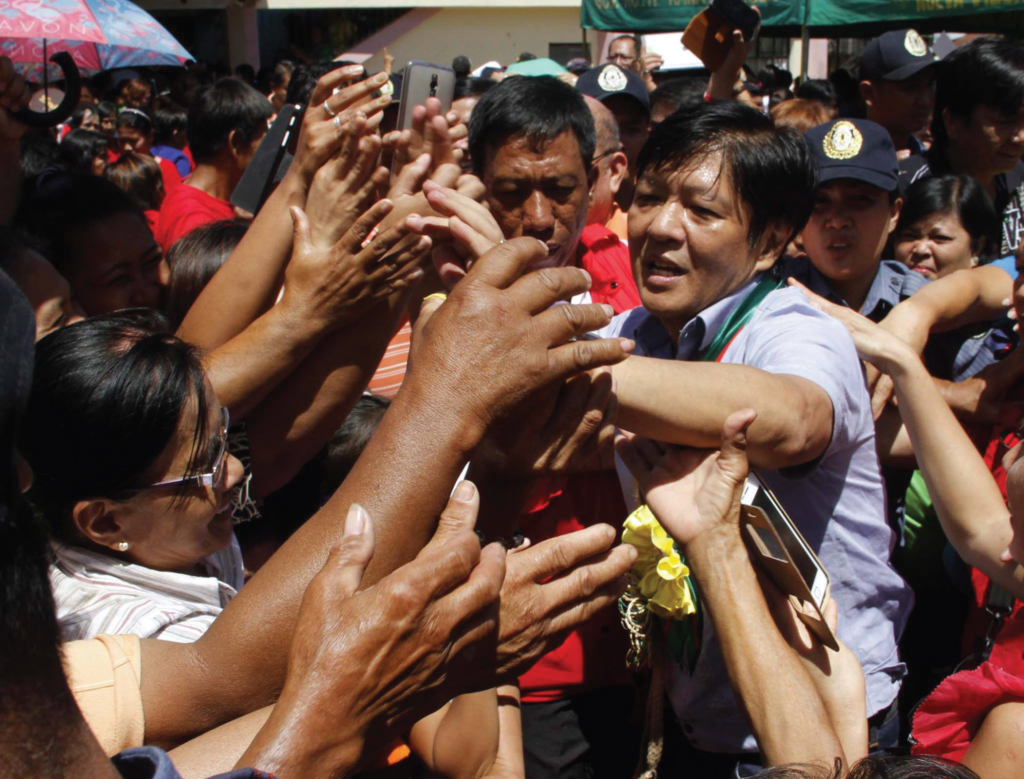By Ferdinand “Bongbong” Marcos Jr.
(Excerpts from a speech before Asia CEOs, July 29, 2018. They are being published here because the speech remains current)
My vision of our country is one that can overcome its economic and social challenges by drawing on our own strengths and drawing on our unity.
It is a vision of the Philippines that is prosperous, rich in opportunity, and home to happy, morally upright, and productive citizens whose lives are meaningful because theirs is a just society, because theirs is a nation that has become great again.
I will immediately work to restore in all Filipinos the lost sense of pride in themselves and pride in being citizens of the Republic of the Philippines. We had at some point in our history that pride, that sense of nationhood but we see it to have gone astray and we have lost it.
Special attention to the poorest
This administration should govern our country with special attention to the needs of the more than 26% of our population who are the poorest, and the almost 70% who are called ‘unpoor’ but actually mean that they live only precariously above the poverty line.
First, I believe business should take the lead in nation-building, in poverty reduction, in developing our shared future. You have demonstrated in your work your ability to do so with your wealth, your skills, and your imagination in raising our economy to a level that has attracted positive elements. But it has happened under a system that has distributed the benefits inequitably.
National unity
The success of our nation depends on national unity, but it is hard for me to imagine how unity can be even be possible when nearly 97% of our people do not feel they are sharing in our so-called ‘economic miracle.’
Despite our economic gains of recent years, at least 3,700 Filipinos leave for jobs abroad every single day. Nearly one in 10 of us are already abroad, meeting our families’ basic needs with the earnings from foreign jobs.
It is distressing to see the most desperate of our people even consigned to the streets, or falling prey to sexual or other forms of exploitation simply because of a lack of opportunities.
These people are our workforce, and our market. They are our greatest resource, a resource that only grows in strength and does not diminish if it is used for the benefit of all.
Asking business to lead us in nation-building is a tall request, and one that government cannot rightly ask if it is not willing to equally share the burden, or take the lead. Which brings me to the second, but no less important point: How can government help business do business?
Government shortcomings
It is perhaps understandable if many doubt whether government actually has the ability (to help business), because recent problems have revealed shortcomings in our efforts to eliminate corruption and improve performance.

The P62.3-billion (P80 billion in 2020) Conditional Cash Transfer Program, directed at the poorest of our poor Filipino families, has not helped all that it could because of leakages, because of weaknesses in the implementation, and because of lack of clarity in principle and in concept as to what the program was meant to achieve.
The modest efforts towards upgrading our armed forces have been hampered by anomalous deals and irregular transactions with suppliers of questionable competence.
Every day, hundreds of thousands of commuters – our workers, our students, our shoppers – face the challenges of using an aging, inadequate commuter rail service that has become unreliable under the best of circumstances, and actually dangerous to life and limb at its worst.
Government and business must change
Government as well as business must change. The “trickle-down” concept of economics, pursuit of profit for profit’s sake with the expectation that the benefits will eventually find their way to the lower levels of our society, is a failure for the common good.
Most recently even Pope Francis, who has offered strong words. In 2013, in his apostolic exhortation “Evangelii Gaudium”, he argued that ‘trickle down’ economics wrongly demand ‘a crude and naïve trust in the goodness of those wielding economic power.’
And as recently as this past July 10, while visiting Bolivia, the Pope condemned the unbridled greed of naked capitalism: ‘Once capital becomes an idol and guides people’s decisions, once greed for money presides over the entire socio-economic system, it ruins society, it condemns and enslaves men and women, it destroys the human fraternity, it sets people against one another and, as we can clearly see, it even puts at risk our common home: the planet Earth.’
Capitalism unacceptable
Capitalism as we know it, whether we like it or not, is becoming socially unacceptable.
Do not take it as a damnation of the capitalist society or the capitalist principle. But merely to say that government must take and must institute and have a mechanism that actively pursue the principle of distribution of wealth.
I think even the most recent rock star of the economics fraternity, a gentleman by the name of Piketty, on his large and rather hard-going book on capital, again seems to have confirmed the same observation that growth in value of capital is never matched, if left to its own devices, by the growth in value of each individual in that economy.
By focusing on poverty, we focus on the fundamental strength of this nation, and our greatest resource, our people. It will require government and business working hand in hand.
But neither business nor the great population of Filipinos can have confidence in a government that does not demonstrate the competence and the ethical commitment to good performance.
